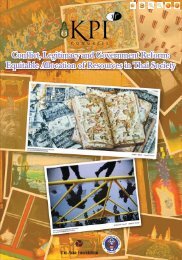SUFFiciENcy EcONOMy ANd GRASSROOtS DEvElOPMENt
SUFFiciENcy EcONOMy ANd GRASSROOtS DEvElOPMENt
SUFFiciENcy EcONOMy ANd GRASSROOtS DEvElOPMENt
Create successful ePaper yourself
Turn your PDF publications into a flip-book with our unique Google optimized e-Paper software.
The Meaning of Sufficiency Economy <br />
International Conference<br />
237<br />
emphasises nurturing and protecting all life. This has been taken as the guideline for<br />
many Thai Buddhist monks who, for instance, have been trying to protect the<br />
pristine forests together with the local communities against the illegal loggers and<br />
the military. 10 <br />
Asoke implements this concept by nurturing and protecting all life: many a<br />
barren land plot has turned into a lush garden in the hands of Asoke practitioners.<br />
Northeastern Thailand, notorious for its droughts and unfriendly natural conditions,<br />
has been one of the central areas for Asoke’s agricultural experiments. Asoke group<br />
has, at the moment, three highly successful centres in the Northeast, Sima Asoke,<br />
Sisa Asoke and Ratchathani Asoke, all of which, have become showcases for the<br />
provincial and district authorities, and all of which are also involved in actively<br />
training local people in the art of natural agriculture, self-sufficiency and sustainable<br />
development.<br />
To become a farmer, is practically the choice number one of a “right<br />
livelihood” for an Asoke practitioner. The Asoke temples thank the farmers for their<br />
daily food in all the Asoke temples at the communal meal. This must be honey to the<br />
ears of the impoverished Thai peasants visiting the temples. Another alternative for<br />
an Asoke practitioner, in more urban surroundings, is to become at least a part-time<br />
gardener.<br />
The export-oriented cash-crop monoculture economy has not only<br />
impoverished the peasants of Thailand, but it has equally impoverished the soil. The<br />
peasants are up to their neck indebted to the money-lenders and landowners, who<br />
have recommended the use of expensive foreign fertilizers, pesticides and<br />
insecticides. These fertilizers have then run into the rivers and rice fields killing all<br />
life in those waters. In some areas the groundwater has been polluted. Therefore, the<br />
second respectable occupation, for a serious Asoke practitioner, is “natural<br />
fertilizer”. <br />
Pollution has become a serious problem both in urban and rural areas - not to<br />
mention the beach resorts. With the modern disposable junk-food culture, garbage is<br />
piling up all over the country. In all Asoke centres, garbage is carefully assorted in<br />
different boxes or sacks. The third “right occupation” is therefore garbage collector<br />
and assorter. Much of this garbage is reused either as composting it into fertilizers,<br />
or into micro-organisms, used for detergents. Old paper, bottles, broken glass and<br />
metal scrap are resold. Plastic bags are reused in the Asoke shops for packing in the<br />
goods for the customer. Garbage is burned and reproduced as cooking gas, for<br />
instance, in Pathom Asoke. <br />
Self-sufficiency is emphasised and all production at Asoke centres is primarily<br />
oriented to their own people, and only secondarily to the wider Thai community.<br />
There has been some demand for Thai herbal medicine abroad, for instance, in<br />
10<br />
One of the most famous cases was Phra Prachak Kuttachitto, a Buddhist monk in Buriram<br />
who tried to protect the forests. Eventually he had to flee for his life. Jim Taylor (1993).














